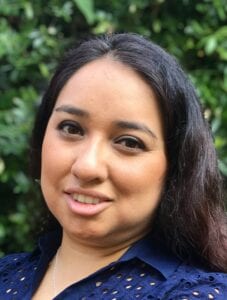
Claudia Gonzaga-Jauregui, PhD, is a member of the Genetics Engagement & Education Network and ASHG’s Public Education & Awareness Committee. Earlier this year, she was also appointed to the 2021 Board of Directors as the Early Career Director. She volunteers to do educational activities with children from underserved and minority communities, judges science fairs, and has been judging the DNA Day Essay Contest since 2010. She is currently the Senior Manager for Mendelian Genetics at the Regeneron Genetics Center.
ASHG: How did you begin in public engagement and education?
Dr. Gonzaga-Jauregui: I’ve always liked teaching. I started as a teaching assistant when I was in undergrad and then when I was in graduate school, I helped start an association for public science outreach in Mexico called Más Ciencia Por México. Later I began volunteering around DNA Day. I reached out independently to classrooms to lead activities and in the last 3 years, I have organized visits to the Abbott House in New York to do genetics activities with immigrant children. I also volunteer for outreach activities through the ASHG GENE Network and initiatives like Skype a Scientist to talk about science, genetics, and my career with middle and high school students. Many of the contacts I get from Skype a Scientist, for example, are for Hispanic students in Texas, California or Florida. It is very important that students see that people who look like them and speak Spanish can also be scientists.
ASHG: How do you make time for public engagement and education?
Dr. Gonzaga-Jauregui: It’s important to me, so I try to squeeze in time to participate in activities, to write science articles, and volunteer. It’s hard because public engagement is not typically considered part of a scientist’s job. It’s a bit of extra work, but worth it. I take advantage of outreach programs at my organization and also carve out time to volunteer to judge science competitions during weekends, such as the Westchester Science Fair or, when I was in North Carolina, the North Carolina Science Olympiad.
ASHG: Do you have a favorite activity you like to do or piece of information you like to share with the groups you visit?
Dr. Gonzaga-Jauregui: I love doing the DNA extraction from a strawberry. It’s fun for the students and me, and it is a very easy activity to do with children, although sometimes it gets messy. DNA is usually talked about as a very abstract thing that has information about you and that geneticists study, or sequence. So, after talking about genetic traits and DNA, it is very exciting for kids to see the little threads of DNA at the end of the experiment. In this experiment, DNA is something they can actually see and touch instead of something abstract.
ASHG: What’s the best memory you have of one of your educators when you were a student?
Dr. Gonzaga-Jauregui: When I was in high school, I enjoyed and did well in biology, math, and science classes in general. However, I didn’t have real life role models who helped me see myself pursuing a scientific career because I didn’t know any scientists and sadly scientific careers are not very popular in Mexico. When it came time to decide my career path, I was considering medicine or law, but my biology teacher encouraged me to participate in the Biology Olympiad. I did, just because I thought it would be fun, and ended up placing first for my state and third nationally. That experience encouraged me to consider a science career and gave me more exposure to real scientists. The next year I decided to participate in the Biology Olympiad again and I did my first summer research internship (that’s when I learned how to use a pipette!). These experiences really helped me decide to pursue a science career. My plan was to study Biology as an undergrad and do postgrad studies in Genetics. But then my high school biology teacher encouraged me again to look into a new program that the National Autonomous University of Mexico had started just that year. Again, I did it out of curiosity and found out that this new undergraduate program focused on everything that I liked – mainly molecular biology, genetics, biochemistry, math and bioinformatics – so I applied to the program and became part of the first class of the Genomic Sciences Undergraduate Program in Mexico. The rest is history.
ASHG: What’s the one thing you want the public to know about human genetics?
Dr. Gonzaga-Jauregui: Human genetics is pervasive in every aspect of people’s lives. Many times, people just think that genetics is about disease, but it’s really the chance to influence health no matter your age. I also want the public to know that humans are very, very similar from a genetics perspective and that many of our dispositions are social constructs. That’s something that should be communicated better in general. Volunteering can be difficult because it’s considered to be something we do on our own time, but I think it’s our responsibility as scientists to be involved in teaching the new generations and communicating science to the public.
